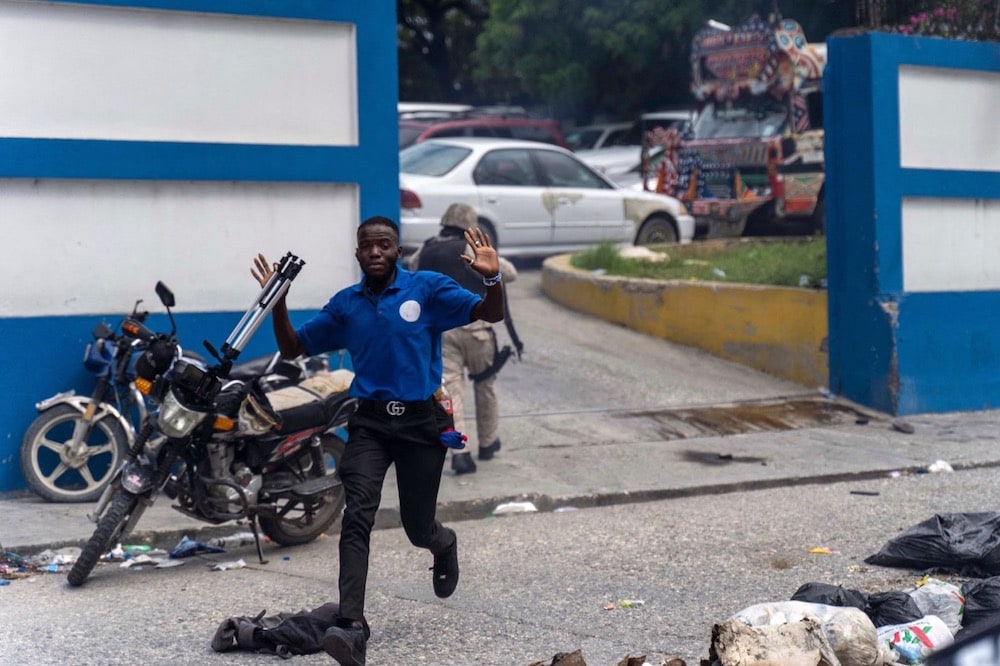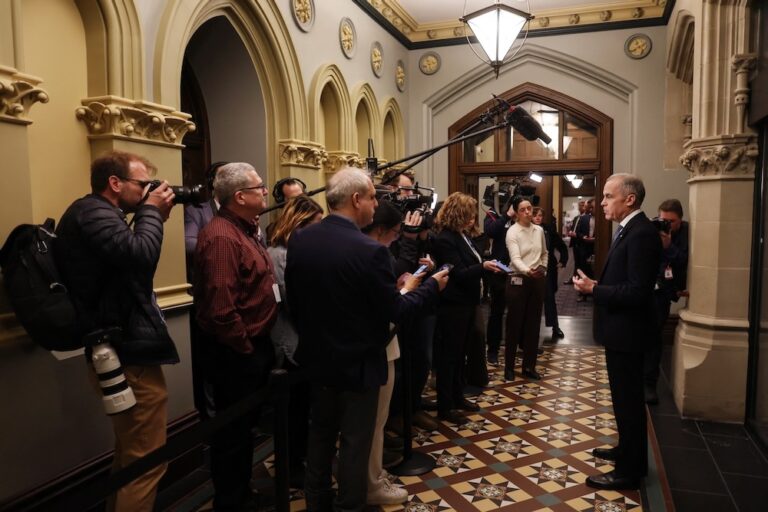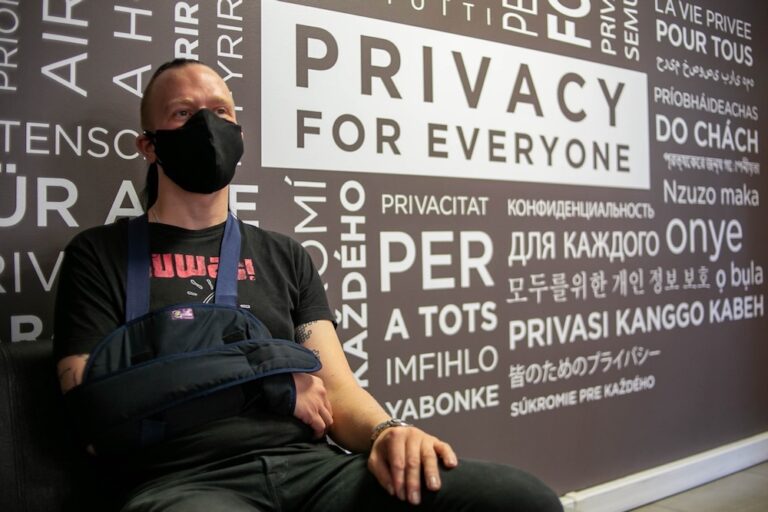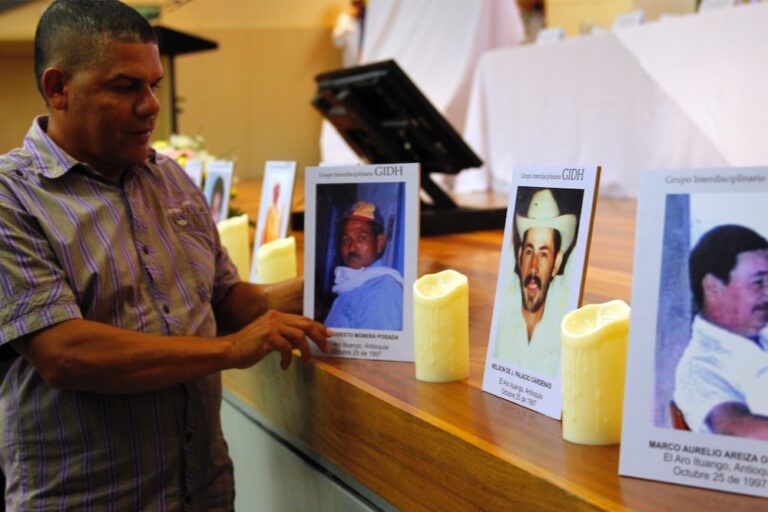October 2022 in the Americas: A free expression round up produced by IFEX's Regional Editor Laura Vidal, based on IFEX member reports and news from the region.
As we mark the International Day to End Impunity for Crimes against Journalists once again, we see in the Americas what happens when crimes against freedom of speech remain unanswered and authoritarianism pushes forward. New findings of the use of Pegasus in Mexico came to light early in the month, while a massive closing of radio stations is deepening Venezuela’s information desert. Journalists and human rights defenders push against government efforts to reduce civic space and silence the press in Nicaragua, and violence takes the lives of journalists in Honduras, Colombia and Haiti.
[Note: This article originally misidentified the lead organisations for the joint report on Pegasus’ use in Mexico. The error has been corrected.]
When impunity opens the door to violence, censorship and surveillance
It has been 10 years since the implementation of the UN’s Plan of Action on the Safety of Journalists and the Issue of Impunity, yet the region has been significantly shaken by issues only possible in a solid climate of impunity. After years of incidents, reports and demands from civil society, both in Mexico and internationally, to impose a moratorium on the spying malware Pegasus, a new joint report (led by ARTICULO19, R3D and SocialTIC) found three new cases of its use and evidence linking the use of Pegasus with both the Mexican government and the army. The report found that the army illegally surveils civil society actors and journalists investigating or working on human rights violations committed by the military.
President Andrés Manuel López Obrador continues to deny the use of Pegasus, despite the evidence, and the Secretariat of National Defence (SEDENA, in Spanish) has attempted to cast doubt on the report and deny responsibility, without directly addressing or denying any of the findings.
Meanwhile, in Colombia, full justice for Jineth Bedoya is still elusive after the Inter-American Court of Human Rights concluded that the state of Colombia was responsible for the violations to her right to life, personal integrity, freedom of expression and equality before the law. It has been a year since the historic ruling, but the process drags on, and the Colombian state has honoured only some of its commitments. Both Bedoya and FLIP (the Colombian Foundation for Press Freedom) have noted the collective interest of the reparations called for, as they relate to the rights of all women journalists who have survived sexual violence.
In Venezuela, the widespread closing of radio stations that began years ago has intensified in recent months. IFEX member Espacio Público keeps a growing list of radio programs, journalists and whole stations forced off the air by order of the National Commission of Telecommunications (CONATEL). It has joined other organisations calling on the Commission to ensure a diversity and plurality of voices and denouncing its “opaque” approach to decision-making.
In parallel, and despite the challenges civil society organisations such as IFEX member IPYS Venezuela face, events and trainings are being offered for journalists and communicators to embrace audio formats to inform and share stories, and to study and recognize the importance of radio in the struggle against information deserts in the country.
Nicaragua: Journalists push back
As in Venezuela, Nicaraguans have seen radio stations taken off the air and media outlets attacked and closed down. The closing of the civic space has become so alarming that UN and IACHR Special Rapporteurs published a press release expressing “their strong rejection” and calling on the government to “cease the judicial persecution of all dissenting voices, […] refrain from using the law arbitrarily [and also] guarantee the life and integrity of persons deprived of their liberty”.
Journalists and human rights defenders are finding ways to continue with their work. Radio Vos embraced digital means to continue transmitting after the government took their equipment and cancelled their licence to use the public airwaves. Many of the journalists who fled the country are continuing their work from abroad. Since 2018, over 120 journalists have left Nicaragua; digital media is now critical to their ability to continue their work, in spite of the challenges they face in exile.
The government’s resolve to quash independent media and civil society seems relentless. Nicaraguan outlet Confidencial notes that October saw the highest number of NGOs forced to close down so far: 67 international non-profit organisations and 33 national NGOs lost their legal status for allegedly failing to comply with obligations. The outlet also reported the discovery, in October, of 39 “fake antennas” suspected to be used by the government to surveil people through their mobile phones.
Most worryingly, we are seeing a new trend aimed at silencing journalists and human rights defenders in exile – the arbitrary arrest of family members of those seen as key opponents by the government. Such is the case with Gabriel López del Carmen, son of Andrea Margarita del Carmen, Program Director of PEN Nicaragua, arrested when authorities failed to find his mother.
Violence takes the life of journalists in Colombia, Haiti and Honduras
October also saw the killings of three journalists in the region. Two occurred in Haiti, where gang violence threatens to take over control of the country. Authorities in the southern city of Les Cayes found the body of radio commentator Garry Tess, host of popular radio program “Gran Lakou”, who had been missing since 18 October. On 30 October, Romelson Vilcin, a correspondent for Generation 80, was killed after being hit in the head with a police tear gas canister in the middle of protests calling for the release of a fellow journalist.
In Colombia, Rafael Emiro Moreno, who was a well-known community leader and the director of independent news outlet Voces De Córdoba (which published local reports on Facebook) was fatally shot by two men on a motorcycle. Moreno had received numerous threats for his reporting on political corruption and drug-trafficking groups. Many of Moreno’s reports were about Córdoba’s governor, Orlando Benítez. According to IFEX member FLIP, Moreno’s is the first assassination of a journalist who had been under the protection mechanism of the state.
In Honduras, Edwin Josué Andino became the fifth journalist killed in the country in 2022. On the morning of 10 October, unidentified individuals in police uniforms kidnapped Andino from his home. Hours before, Andino’s father had been kidnapped and shot. Andino was 23 years old and had graduated from journalism school in 2021. He worked for La Tribuna TV (LTV) station, whose director, Raúl Morazán, said he was not aware of any threats against the journalist.
In brief
Renowned Guatemalan journalist and director of elPeriódico, José Rubén Zamora, has been imprisoned for three months under trumped-up charges of money laundering. For many of the organisations demanding Zamora’s release, this case is a clear illustration of the misuse of the law in order to silence journalists. Flora Silva, financial director of the journal, is also in prison under the same charges.
Brazil’s elections took place among a difficult context marked by polarisation, misinformation and constant attacks against journalists. The victory went to Lula da Silva, by a narrow margin. Initially, ousted president Jair Bolsonaro delayed publicly recognizing the results, but eventually signalled that the transfer of power would proceed. In the interim, many of his supporters took to the streets to protest, adding to the fear felt by many that violence would follow the election results.



